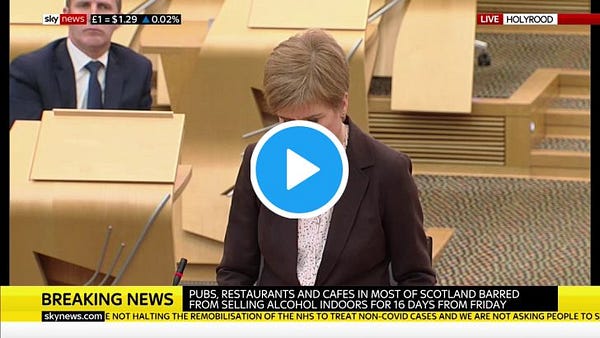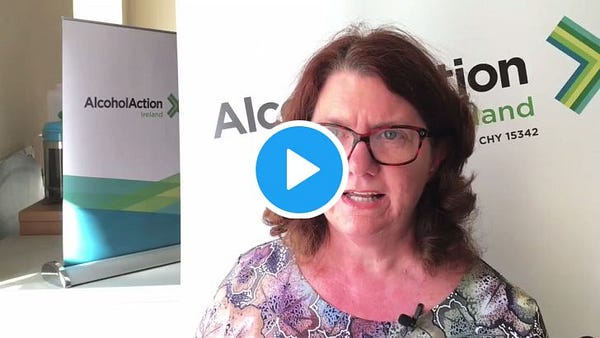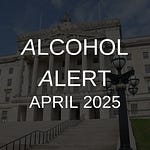Hello and welcome to the Alcohol Alert, brought to you by The Institute of Alcohol Studies.
In this edition:
COVID-19: Latest lockdown measures leave pubs in tiers
IAS second briefing on COVID-19 alcohol consumption warns of the hidden harm from the rise in increasing and higher risk drinking 🎵 Podcast feature 🎵
ScotRail considers a blanket ban on alcohol on Scottish trains
Government in call for evidence for review of alcohol duty
Research finds that NoLo beers have a small impact on alcohol purchases
Scottish and Irish governments face challenges over minimum unit pricing legislation
Sobriety tag scheme reaches Wales
Heineken fined £2m for breaching Pubs Code
We hope you enjoy our roundup of stories below: please feel free to share. Thank you.
COVID-19: Latest lockdown measures leave pubs in tiers
As the UK began to experience an upturn in coronavirus case numbers, so policymakers in the devolved administrations started looking at tackling the sources of the dreaded second wave of COVID-19, and pubs have come under close scrutiny in all quarters.
Scotland
Scotland decided to close pubs across its central belt for a 16-day period, and limit the opening hours of other licensed premises, as part of a ‘circuit breaker’ lockdown (Scottish Government, 07 Oct).* Quoting her chief medical officer’s evidence, first minister Nicola Sturgeon drew a correlation between the ‘more than one fifth of people contacted by Test and Protect’ who reported visiting a hospitality setting, and the increase in the R rate above 1 ‘approximately three weeks after the hospitality sector opened up’:


* subsequently extended to 02 November (STV News, 21 Oct)
Wales
In Wales, where a 10PM curfew on selling alcohol for licensed premises was introduced last month, first minister Mark Drakeford proceeded to issue a ‘firebreak’ lockdown of his own – turning pubs into takeaway taverns only between 23 October and 09 November (Welsh Government, 19 Oct).
England
The same curfew applies to England. However, lawmakers decided to adopt the novel approach of localising management of the lockdown with a tier system, which has resulted in curious outcomes such as a legal definition of what a ‘substantial’ meal is, for the purpose of allowing some licensed premises to continue to operate under the most severe tier restrictions (The Mirror, 12 Oct).
For some venue owners, the new rules also mean that in addition to pressure from law enforcement to check IDs for names and addresses in a bid to stop households mixing (EuroWeekly, 21 Oct), those situated in ‘high’ and ‘very high’ tier areas are either subject to the inevitability of fewer customers paying a visit, or temporary closure for wet-led pubs. One Financial Times article predicts the end of chains whose main custom is serving alcohol (13 Oct):
On the face of it, the most affected of the UK’s listed national inn groups are Marston’s, JD Wetherspoon and M&B. It looks like last orders.
Large proportions of Marston’s and JD Wetherspoon’s hostelries are wet-led. Food as a percentage of JDW’s total sales rank among the lowest in the sector. More than two-thirds of Marston’s pubs are old-fashioned boozers.
All three groups are loaded with debt, which even last year was many times ebitda. Earnings of all three are expected to at least halve this year. Marston’s stood at about £1·4bn at the last count or £1·2bn including the cash coming in from the brewing joint venture with Carlsberg opportunely signed this summer. That could be more than 10 times this year’s ebitda. Pub earnings of many groups will barely cover interest bills this year.
The resulting uncertainty has only served to anger licensees and those sympathetic to the plight of the industry. Some have pulled stunts, such as a retaliatory ban (Telegraph, 30 Sep); others have sought further evidence for the 10PM curfew’s effectiveness and whether it represents a threat to the health of people thrown out of pubs and restaurants at the same time (London Evening Standard, 06 Oct); but The Night Time Industries Association has launched legal action to try to prevent the new lockdown measures entirely (Daily Mail, 12 Oct).
Whatever the outcome, the reality of the current measures will most likely be a further loss of jobs in the hospitality sector, like Greene King (Sky News, 07 Oct), and a permanent shutdown of licensed premises – as many as one in five, according to real estate adviser Altus Group (Morning Advertiser, 08 Oct).
Northern Ireland
Having already set a curfew time for licensed premises of 11PM as opposed to 10PM in other areas of the UK, the Stormont executive decided to do lockdown a little differently from the other Home Nations too. Their first minister, Arlene Foster, announced a four-week shutdown of the hospitality sector apart from deliveries and takeaways for food only during trading hours. Uniquely, Northern Ireland is the only nation to address the availability of alcohol in the off-trade too: off-licences and supermarkets will not be permitted to sell alcohol after 8pm (Northern Ireland Executive Office, 14 Oct) during the period.
Too much focus on pubs?
In the row between government and the hospitality sector over the COVID-19 restrictions, the deputy chief medical officer for England was reported to have said that he ‘could not guarantee’ the 10PM curfew would ‘bring the virus under control’ (The Telegraph, 18 Oct, £wall), instead preferring a mandatory closing time of 6PM.
But while much has been made of the impact of the latest round of restrictions on licensed premises, supermarkets have benefited from the increase in alcohol purchases in the four weeks to 04 October: Kantar data reported Britons spent an extra £261m on alcohol in grocery stores (Guardian, 13 Oct).
Data from Public Health England Wider Impacts of COVID-19 on Health (WICH) monitoring tool indicates the influence of pandemic-induced home drinking on the intake of increasing and higher risk drinkers.


COVID-19 briefing warns of rising health risks to heavy drinkers
🎵 Podcast feature 🎵
The second Institute of Alcohol Studies briefing on alcohol consumption during the COVID-19 pandemic (08 Oct) warns of the hidden harm from the rise in increasing and higher risk drinking and highlights the need for the UK Government to find public health solutions to the issue.
Speaking on the podcast, Dr Sadie Boniface, IAS head of research, who authored the briefing, hinted at the impact that increased consumption among the heaviest drinkers may have on treatment providers for substance problems:
In terms of treatment for substance use problems including alcohol, there’s been a bit of a fall compared with the same time period last year, but I have read some other statistics as well that say it’s starting to pick up now, so what’s really concerning is that problems to do with increased drinking during the pandemic might be being stored up for the future.
Alcohol ban on Scottish trains under consideration
According to The Scotsman, national train operator ScotRail have informed the Rail Maritime and Transport (RMT) Union of the possibility of bringing in ‘a full all-hours drinking ban on trains in a bid to tighten up on COVID-19 safety measures’ (17 Oct).
It comes after the nation’s first minister Nicola Sturgeon said more stringent travel rules ‘need to be considered’.
However, the move is rumoured to have been put on hold after the British Transport Police (BTP) called for more time to consider the resource implications, and the RMT have expressed some concerns about enforcement of the new rules.
Mick Hogg, regional organiser for the RMT in Scotland, said: ‘We have been told by ScotRail that there will be a full ban on alcohol on trains as a COVID-19 measure. We welcome that.
‘But it has to be resourced or it puts more pressure on our staff. It’s a double whammy for them. They can’t enforce the wearing of masks or police passengers drinking alcohol. That has been a big issue for a while. We know the BTP don't have enough staff as it is.’
ScotRail’s current alcohol byelaws state that passengers can't drink alcohol on their trains between 21:00 and 10:00hrs, and they may not allow you to board if you are extremely drunk. But this has not stopped it happening. One conductor told the newspaper: ‘Busy weekend nights haven't calmed down in recent weeks. People from Edinburgh and Glasgow have been piling on trains across to Fife to go to the pub. I've seen packed trains with the vast majority of passengers drunk’.
Government in call for evidence for review of alcohol duty
Public health and trade organisations are lining up to submit evidence to the Alcohol duty review, as per the government’s Budget announcement earlier this year (Gov.uk, 01 Oct).
The review has been widely welcomed by stakeholders, as the UK gains the power to reform alcohol taxation following their departure from the European Union.
HM Treasury’s call for evidence will also ask whether:
the method of alcohol taxation should be standardised
the duty categories should be changed or unified
products should be consistently distinguished by their strength
distinctions should be made based on the place of retail
small producer reliefs should be extended or standardised
duties could be uprated for inflation in a more consistent manner
a single process for approvals, declarations and payments should be introduced
more could be done to tackle avoidance and evasion of duty
The deadline for responses is 29 November.
NoLo beers have small impact on alcohol purchases
Research published in BMJ Open has found that there were significant but small reductions to alcohol sales following the introduction of new no and low alcohol beers during 2017–2018 and reformulation of existing beers to contain less alcohol during 2018 (12 Oct).
Using purchase data from Kantar Worldpanel’s household shopping panel for 2015–2018, researchers looked at the purchasing habits of 64, 286 British households following a period which saw 46 new low and no alcohol beer beverages and 33 beer beverages reformulated to contain less alcohol. A step-jump in volume bought was noticed for both beverage types at the beginning of March 2017 and during mid-March 2018 respectively.
Interrupted time series analyses found a combined associated impact of both events with relative reductions of alcohol by volume of beer between 1·2% and 2·3%; purchases of grams of alcohol within beer between 7·1% and 10·2%; and purchases of grams of alcohol as a whole between 2·6% and 3·9%. The reductions were greater for reformulation than for the introduction of new low and no alcohol products. Reductions were independently higher for younger age groups of shoppers and for households that bought the most alcohol.
The research team conclude that the fact that the volume of purchases for both new low and no alcohol beer products (2·6% of total beer volume purchased during 2018) and of new reformulated beer products (6·9%) was very small ‘indicates that there are future opportunities to increase the volume of such products so as to reduce the harm done by alcohol’.
In other news
A 30-year review of global disease burdens published in The Lancet finds alcohol use was the leading risk factor for those aged 25–49 years (17 Oct). Overall, alcohol use was one of the fastest growing burdens, at more than 0·5% per year. When split by sex, ‘there were large differences between attributable deaths in males and females due to alcohol use, which accounted for 2·07 million (1·79–2·37) deaths in males and 0·374 million (0·298–0·461) deaths in females in 2019’. The national picture estimated alcohol to be the cause of approximately 4% of deaths and 5% of Disability Adjusted Life Years in 2019 (illustrated).


A team of researchers will establish the effectiveness and cost‐effectiveness of the Drink Less app at reducing alcohol consumption among hazardous and harmful adult drinkers, in what will be the first randomised controlled trial of an alcohol reduction app for the general population in the UK (17 Oct). The result of the study will inform the decision on whether it is worth investing resources in large‐scale implementation.
Alcohol screening and supportive interventions from primary care practitioners can help older people make healthier decisions about their alcohol use, according to a qualitative study published in the British Journal of General Practice (19 Oct). A total of 24 older adults aged ≥65 years and 35 primary care practitioners in northern England participated in interviews and focus groups. Researchers found that they were motivated to make changes to their alcohol use when they experienced symptoms, and if they felt that limiting consumption would enable them to maintain their quality of life.
Minimum unit pricing – the latest from Scotland and Ireland
Scotland: is a legal challenge possible?
The Scottish Parliament voted 90 to 28 to refuse legislative consent to the UK Internal Market Bill (BBC News Scotland, 07 Oct), fearing that the legislation could cause a constitutional rift that would open bold public health measures such as minimum unit pricing for alcohol (MUP) to another legal challenge.
The Westminster government is not bound by the vote in Holyrood, but the Scottish constitution secretary notes that it formalises the nation’s ‘explicit’ and comprehensive rejection of the bill. Last month, Michael Russell said in a statement (Scottish Government, 08 Sep) that the bill would ‘open the door to a race to the bottom on food standards, environmental standards and will endanger key public health policies such as minimum unit pricing.’
The Secretary of State for Scotland Alister Jack issued a rebuttal denying the ‘false claims’ made by First Minister of Scotland Nicola Sturgeon about the bill, assuring in point four of his statement that MUP would still have been introduced:

But devolution expert Jess Sargeant states that the internal market bill could be interpreted in a way that ‘inevitably will place greater limits on devolved competence than present arrangements’, which could also ‘impede key benefits of devolution “as a policy lab”, allowing new policies to be tried in one jurisdiction before being adopted elsewhere’. (Institute for Government, 14 Sep)
This opinion was supported by an advisor to Holyrood's Constitution committee, who told The Scotsman that ‘issues may arise if minimum pricing is considered in the context of “indirect discrimination”’, and this may give rise to a court challenge (12 Oct).
He explains in a paper: ‘A Scottish rule that applies Minimum Unit Pricing to all alcohol whether domestic or imported could be indirectly discriminatory if it impacts more on imported alcohol than it does comparable Scottish-produced alcohol’. Rules will be assessed on three conditions, including on the grounds of whether it ‘cannot reasonably be considered to be a necessary means of achieving a legitimate aim’.
Although the ‘protection of public health’ is recognised in the bill as a legitimate aim, the advisor warns there could be questions raised around whether MUP will be ‘reasonably’ considered to be ‘necessary’ to achieve this aim, and so a challenge based on the new conditions may be brought.
Irish MUP still on ice two years on from the Public Health (Alcohol) Act
The Irish Times reports that on the second anniversary of the Public Health (Alcohol) Act, MUP is still to be implemented (12 Oct). Alcohol Action Ireland’s head of advocacy Eunan McKinney went further, saying that there is ‘no starting date for the “difficult stuff”… including labelling on all alcohol products of the links to cancer, the 9PM broadcasting watershed for alcohol advertising, and restriction on the content of advertising to make it “utilitarian” with “no hero, no glamour”’.
The news comes as the Budget 2021 statement made no direct reference to alcohol, meaning duties were left unchanged (Government of Ireland, 13 Oct). While Alcohol Action Ireland (13 Oct) welcomed ministers for not acquiescing to ‘the extensive lobbying of the alcohol industry, who had sought a 15% reduction’, they regretted the missed opportunity ‘to introduce a Cost-of-Living index to excise rates’, amongst other plans outlined in their Pre-Budget submission.
Responding to the Budget, Alcohol Action Ireland chief executive Dr Sheila Gilheany (listen to the podcast for her full statement) said that ‘everyday that delays these measures being introduced can be counted in lives unnecessarily lost and endless public expenditure that could be saved, if implemented they will undoubtedly achieve better public health outcomes. Left dormant on the statute books, they are useless.
‘What’s required now, two years on, is a firm timeline from Taoiseach and his government that commits to the implementation in full of the suite of measures whose effectiveness relies on coherent and cohesive actions.’


Sobriety tag scheme reaches Wales
Offenders convicted of alcohol-related crimes in Wales can now be banned from drinking and ordered to wear a sobriety tag by judges (Gov.uk, 21 Oct).
The ankle tags will monitor offenders’ sweat every 30 minutes and alert probation staff if alcohol is consumed. Those found in breach of their drinking bans can face fines or be sentenced in court. The tags can be given out when courts impose an alcohol abstinence order, a new power which serves a drinking ban on an offender for up to 120 days. The Ministry of Justice says treatment referrals for alcohol use will continue to be made for those with more serious alcohol addictions who commit crimes.
The Welsh scheme follows two pilots in London and across Humberside, Lincolnshire and North Yorkshire, both of which showed that offenders were sober on 97.4% of the days monitored, although their apparent success is qualified by the fact they involved fewer than 500 people, and only six participants agreed to be interviewed about the tags in the Humberside, Lincolnshire and North Yorkshire pilot (NatCen, Oct 2019).
Secretary of State for Wales Simon Hart said: ‘Alcohol can have a devastating impact on lives and figures show it is a key factor behind far too many crimes.
‘I am encouraged to see Wales at the forefront of implementing this new technology, which we believe will contribute towards lowering reoffending rates, making our streets safer and supporting those who need help.’
Heineken fined £2m for breaching Pubs Code
The pubs code adjudicator (PCA) has found Heineken guilty of forcing tenants of its public houses to sell ‘unreasonable’ amounts of their own beers and ciders (Gov.uk, 15 Oct).
Following a three-year investigation ending in July 2019, Fiona Dickie concluded that Heineken – via its pubs business, Star – had ‘seriously and repeatedly’ breached laws that protect publicans from company behaviour aimed at prohibiting pubs selling competitor brands. This was despite repeated regulatory interventions and clear arbitration rulings from the adjudicator.
Dickie said: ‘The report of my investigation is a game-changer. It demonstrates that the regulator can and will act robustly to protect the rights that parliament has given to tied tenants.’
The PCA’s assessment of industry malpractice found Heineken had committed a total of 12 breaches with the result that it had frustrated the principles of the Pubs Code. As well as identifying how the company had offered stocking terms that had acted as a deterrent to pub tenants pursuing a free-of-tie tenancy, the PCA highlighted systemic corporate failures by Star in its approach to compliance.
The news comes weeks before the conclusion of a government review into the Code itself. The tie element of the Code has long been criticised by pub owners and campaigners, who say it is being routinely abused by deep-pocketed pubcos able to flout the spirit of the code that governs it (Guardian, 15 Oct).
The PCA also discovered that the company rewrote the job description of Code Compliance Officer ‘to ensure the Code is interpreted to the commercial benefit of Heineken UK’. This breached the Code requirement to appoint a compliance officer whose role is to verify compliance.
Dickie decided upon ‘the imposition of a sanction’ to ‘change the company’s mindset’ towards compliance and ‘serve as a deterrent to future non-compliant conduct by Star and other pub-owning businesses’.
As well as imposing the fine – which can account for up to 1% of the relevant pub-owning group’s annual UK turnover – the PCA has also ordered Star to make all its free-of-tie tenancies Pubs Code compliant and to ensure future Code compliance.
In response, Star pubs managing director, Lawson Mountstevens, said in a statement: ‘We are deeply disappointed and frustrated at the outcome of this investigation.
‘There are many aspects of the report that we fundamentally disagree with and we are actively considering an appeal.
‘This penalty is unwarranted and disproportionate, and comes at a time when the entire sector is in serious financial crisis as we work around the clock to support our pubs and licensees to keep their businesses afloat.’
Dickie has given Heineken six weeks to provide a detailed response to how it will implement her recommendations, and has ordered them to write to all its tenants explaining her findings, the measures Star is taking to respond to them and how these will affect tenants in practical terms.
‘I will be holding discussions with all the companies I regulate following my findings about how they will ensure they are code-compliant,’ Dickie said. ‘My message is that if anyone previously had any doubts about my resolution to act when I find breaches, they can have no doubt now.’
The UK Alcohol Alert (incorporating Alliance News) is designed and produced by The Institute of Alcohol Studies. Please click the image below to visit our website and find out more about us and what we do, or the ‘Contact us’ button. Thank you.














